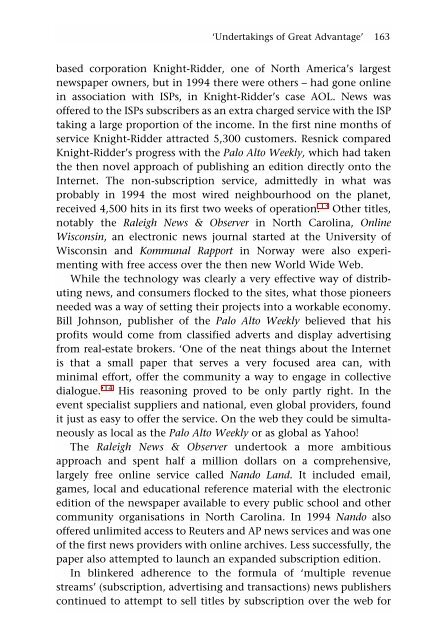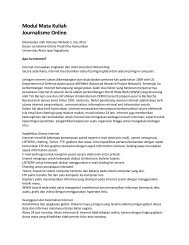Online Journalism - Ayo Menulis FISIP UAJY
Online Journalism - Ayo Menulis FISIP UAJY
Online Journalism - Ayo Menulis FISIP UAJY
You also want an ePaper? Increase the reach of your titles
YUMPU automatically turns print PDFs into web optimized ePapers that Google loves.
‘Undertakings of Great Advantage’ 163<br />
based corporation Knight-Ridder, one of North America’s largest<br />
newspaper owners, but in 1994 there were others – had gone online<br />
in association with ISPs, in Knight-Ridder’s case AOL. News was<br />
offered to the ISPs subscribers as an extra charged service with the ISP<br />
taking a large proportion of the income. In the first nine months of<br />
service Knight-Ridder attracted 5,300 customers. Resnick compared<br />
Knight-Ridder’s progress with the Palo Alto Weekly, which had taken<br />
the then novel approach of publishing an edition directly onto the<br />
Internet. The non-subscription service, admittedly in what was<br />
probably in 1994 the most wired neighbourhood on the planet,<br />
received 4,500 hits in its first two weeks of operation. 13 Other titles,<br />
notably the Raleigh News & Observer in North Carolina, <strong>Online</strong><br />
Wisconsin, an electronic news journal started at the University of<br />
Wisconsin and Kommunal Rapport in Norway were also experimenting<br />
with free access over the then new World Wide Web.<br />
While the technology was clearly a very effective way of distributing<br />
news, and consumers flocked to the sites, what those pioneers<br />
needed was a way of setting their projects into a workable economy.<br />
Bill Johnson, publisher of the Palo Alto Weekly believed that his<br />
profits would come from classified adverts and display advertising<br />
from real-estate brokers. ‘One of the neat things about the Internet<br />
is that a small paper that serves a very focused area can, with<br />
minimal effort, offer the community a way to engage in collective<br />
dialogue.’ 14 His reasoning proved to be only partly right. In the<br />
event specialist suppliers and national, even global providers, found<br />
it just as easy to offer the service. On the web they could be simultaneously<br />
as local as the Palo Alto Weekly or as global as Yahoo!<br />
The Raleigh News & Observer undertook a more ambitious<br />
approach and spent half a million dollars on a comprehensive,<br />
largely free online service called Nando Land. It included email,<br />
games, local and educational reference material with the electronic<br />
edition of the newspaper available to every public school and other<br />
community organisations in North Carolina. In 1994 Nando also<br />
offered unlimited access to Reuters and AP news services and was one<br />
of the first news providers with online archives. Less successfully, the<br />
paper also attempted to launch an expanded subscription edition.<br />
In blinkered adherence to the formula of ‘multiple revenue<br />
streams’ (subscription, advertising and transactions) news publishers<br />
continued to attempt to sell titles by subscription over the web for
















